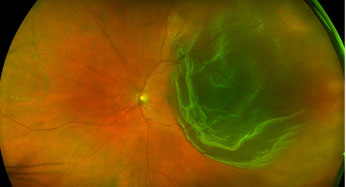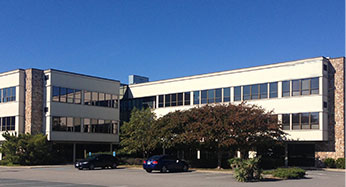Our retina specialists are board-certified ophthalmologists with advanced training in vitreoretinal surgery to diagnose and manage the full spectrum of diseases affecting the retina, macula, and vitreous.
Central Serous Choroidopathy/Retinopathy
What is Central Serous Retinopathy (CSR)?
The retina is the light sensitive tissue that lines the inside of the eye. It is responsible for collecting the signal that is sent to your brain to be decoded into the image that you see. Central serous retinopathy (CSR) is a condition that fluid to collect underneath the retina in the macula, a critical portion of your retina for central vision. The layer normally responsible for removing this fluid is known as the retinal pigment epithelium (RPE). Through mechanisms not completely understood, CSR develops as a result of malfunctioning of the RPE layer, which allows this fluid to accumulate. When fluid exists underneath the retina it prevents it from functioning properly and results in blurred/distorted vision. CSR affects young males most commonly, usually between the 4th and 6th decades of life.
What are the Risk Factors for CSR?
Stress is a major risk factor, and individuals are usually more "type A" with regimented lifestyles. Other risk factors include the use of steroids, whether it be topical, inhaled, oral, or injections in your neck, back, or joints.
How is CSR Diagnosed?
Diagnosis involves a dilated eye exam. Depending on the setting your doctor may order an image known as an OCT, or an angiogram to help assist in the diagnosis. Both of these diagnostic procedures can be done in the office.
Will my vision recover?
Vision usually recovers within 6 weeks but may take longer. While the vision most often returns close to what it was prior to the episode, you can be left with subtle distortions in your vision. Recurrent episodes are not uncommon, and with each subsequent episode, vision may be affected more. Involvement of the opposite eye is possible.
Aside from observation, in certain settings, your doctor may discuss use of a laser to help the fluid go away quicker, or in cases of chronic fluid that does not resolve on its own. Avoidance of unnecessary steroid exposure is a crucial part of prevention of subsequent episodes.
Online Resources
- What is Central Serous Chorioretinopathy? - American Academy of Ophthalmology



